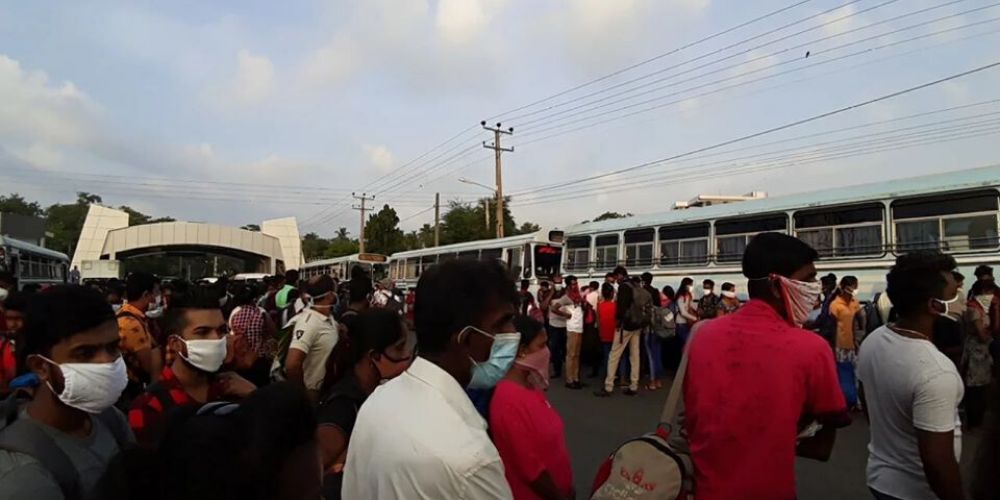Chamila Thushari, the head of the programs of “Da Bindu Collective” saying there isn’t enough responsibility from companies on workers of Katunayaka and other free trade zones as well as Northern Province. While rising the number of Covid-19 affected workers, companies don’t take much actions to buildup sanitary facilities or leave to workers says Chamila Thushari. This is her idea of the current situation.

How travel bans and leave policies under the current situation affect the FTZ workers?
If lockdown the country under Covid-19, they think inevitably running factories. It is an essential service or not is another fact. Even they will order to work after getting infection more workers. Authorities said that, has a travel ban but workers can go to the factories. An incident happened north, authorities stopped buses transporting workers from Mulativu to Kilinochchi due to the Covid-19. But commonly, it must be given the leave to this workers. On the other hand, they must have been quarantine facilities if affected.
How do you describe the shady situation of running these factories?
State institutions and other private sectors are calling only 25% of their workforce. These people did it only first phase. At least reports 25 cases after 100 PCRs. The Situation becoming dangerous in every trade zones. There were 400 positive cases of a 2500 group of one factory. There are 200-300 daily case reports in Biyagama also. One area of Biyagama was lock downed. While running the lockdown, workers must go to work. They facing a lot of struggles in their boarding places also. Like the previous phase, minimally not has been exhibit a notice that mentions a place quarantine. On that, the pandemic will be a disaster. Why I am saying that because there are many workers from several factories who live in one boarding place. After getting the disease, they are facing to transport too far areas like Jaffna. Facilities are very low in that places. There will generate new struggles to others that after came back quarantined people. Not has a common policy is the main problem.
Can manage the economy and job security if taking their service as a roster?
Can’t. We saw failures of roster system. 13 November of last year ILO said to the government that must be directed to establish Covid-19 preventing committees in every factories. Only two factories have taken action on these guidelines. For that reason the pandemic was got worst in other places. There was not 01- meter distance also that guided by the health sector. After getting sick a person, from the line only one who works very closely will be getting leave but others are working. All are using the same canteen and go on the same bus without properly distance. No enough sanitary facilities in the Boarding place. They are using common lavatories and wells. We have not learned lessons even after one year of experience.
Do you have any suggestions for this?
The suggestion is the closing all factories for some period with salary leave to workers. Or, factories must be running after establish recognized standards. A quarantine process must be done in the working district. If many people get sick or died can’t run any factory. On giving the accommodation in the factory premises that is not spread disease to other factories. A worker who I know infected and wasn’t sent to quarantine. Others of her boarding place who work several factories are sharing the bath tap and lavatory. Pregnant mothers and children are living in some of these boarding houses. 40 people were positive Covid-19 in such a place. That is the reason we are saying that factories must be responsible for their workers in this phase. Another injustice is wage-cutting of comers after quarantine. They have lost salaries during the quarantine period.
Lasantha De Silva

